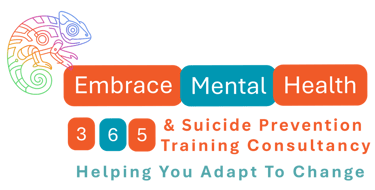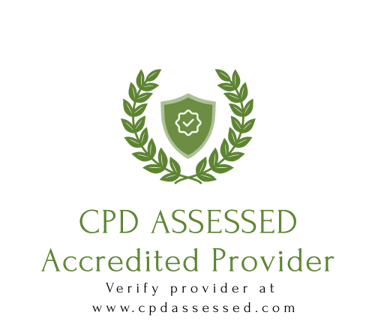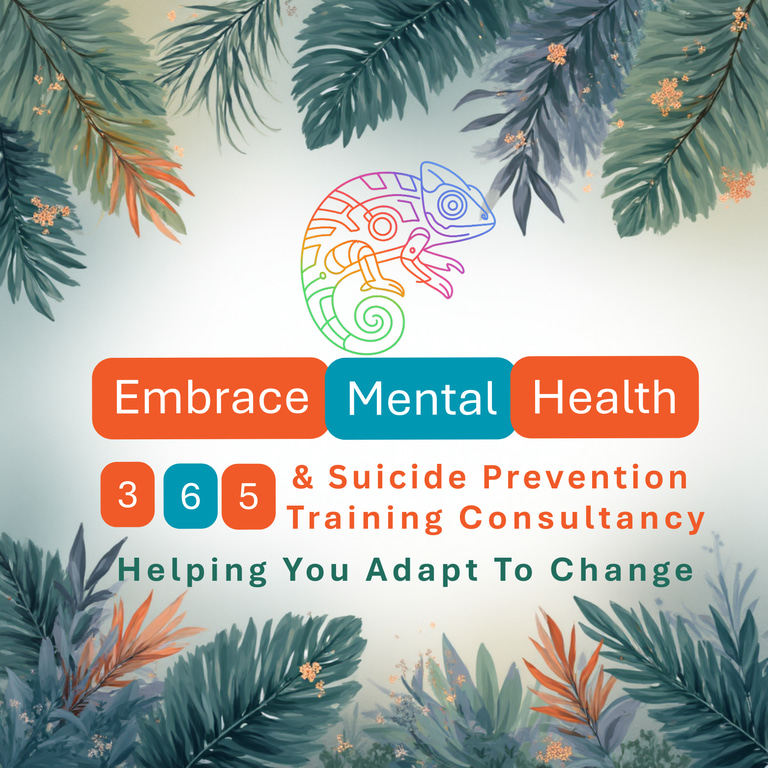WE ARE COMMITTED TO POSITIVE MENTAL HEALTH &
A ZERO SUICIDE SOCIETY THIS IS OUR ONLY MISSION STATEMENT.
Embrace Your Mental Health
Providing cutting edge mental health training and consultancy to help promote positive Mental Health & prevent suicide.
How does our training look?


We always use blended learning - as we don't believe in "death by PowerPoint".
Our training can be activity based workshop style.
You will find some of the materials and training challenging - this is because we believe training outside the comfort zone yields the best results and outcomes.
We strongly recommend our bespoke service - we do not deliver or believe in the 1 size fits all approach.
We deliver in your workplace - or happy to help you source a venue.
Key benefits.
Life-Saving Skills:
Learn to recognise signs of mental health concerns and intervene effectively.
Empowerment & Confidence:
Gain the confidence to have open conversations about mental health.
Enhanced Workplace Culture:
Foster a supportive and inclusive work environment.
Evidence-Based Training:
Our programs are grounded in evidence-based practices and best practices & a combination spanning over 50 years of professional practice and lived experience.
Reduced Stigma:
Emphasise how training breaks down stigmas surrounding mental health, encouraging open communication and help-seeking behaviour.
Increased Productivity:
Address the link between untreated mental health concerns and decreased workplace productivity. We aim to highlight how training can create a healthier work environment, potentially leading to improved productivity & increased bottom line.
Improved Employee Morale:
Trained employees feel more supported and understood, fostering a more positive and collaborative work environment.
Compliance with Regulations & law:
We will support you in increasing your awareness of the key pieces of legislation & law that govern workplaces, to ensure you are fully compliant.
Long-Term Positive Impact:
Investing in mental health training can create a ripple effect, promoting positive mental health practices throughout your workplace and the wider business community.
Mental Health Awareness for Everyone:
Reduced stress, improved self-care, and better interpersonal relationships.
Suicide Prevention Training:
Increased confidence in intervening during a crisis situation, potentially saving a life.
Workplace Mental Health Training:
Improved employee retention, reduced absenteeism, and a more positive employer brand.


Acknowledge the challenges people face and offer reassurance.


Level 3 Mental Health Awareness Training Course Summary
This comprehensive Level 3 training course equips you with the knowledge and skills to promote mental health awareness and well-being in yourself and others, specifically within the UK context.
Mindfulness helps reduce stress, improve concentration, and enhance overall emotional well-being .
Regular practice can help you stay grounded and better manage the challenges of daily life .


Transforming Mental Health Awareness:
We Use Blended Learning & Fun To Maximise Full Engagement






Foundational Knowledge
Interactive Assessments
Stimulating Conversations
1. Understanding Mental Health:
Defining Mental Health:
Debunk myths and misconceptions surrounding mental health. Explain the spectrum of mental well-being, from thriving to experiencing challenges.
Common Mental Health Conditions:
Provide an overview of common mental health conditions like anxiety, depression, bipolar disorder, and PTSD.
Signs & Symptoms:
Equip participants with the ability to recognise early warning signs and symptoms of different mental health concerns.
2. Importance of Self-Care:
Stress Management Techniques:
Introduce practical strategies for managing stress, such as relaxation techniques, mindfulness exercises, and healthy sleep habits.
Building Resilience:
Explore ways to build resilience and coping mechanisms for navigating challenging situations.
Importance of Healthy Lifestyle Habits:
Discuss the link between healthy diet, regular exercise, and quality sleep with improved mental well-being.
3. Recognizing & Responding to Crisis Situations:
Suicide Prevention Awareness:
Highlight the importance of suicide prevention and common warning signs of suicidal ideation.
Active Listening Skills:
Develop effective communication skills to engage with someone experiencing emotional distress.
Crisis Intervention Resources:
Provide participants with knowledge of available resources for crisis intervention, such as hotlines, mental health professionals, and support groups.
4. Stigma & Discrimination:
The Impact of Stigma:
Discuss the negative consequences of stigma surrounding mental health and the importance of open communication.
Building Inclusive Environments:
Explore ways to create supportive and inclusive environments where individuals feel comfortable seeking help.
Language & Communication:
Promote awareness of respectful and inclusive language when discussing mental health concerns.
5. Self-Advocacy & Seeking Help:
Normalising Help-Seeking:
Emphasise the importance of seeking professional help as a sign of strength and self-care.
1. Scenario-Role-Playing:
(These are just examples & are not prescriptive; we can tailor to your exact needs:)
Divide participants into pairs and assign each pair a scenario. The scenarios might involve situations like a colleague expressing feelings of burnout or a friend exhibiting signs of anxiety.
Activity:
One participant acts as the concerned friend/colleague, while the other practices active listening and offers support based on the training content. Then, they switch roles.
Benefits:
This activity helps participants practice communication skills, build empathy, and apply learned strategies in a safe, simulated environment.
2. Group Discussions & Debates:
Description:
Pose a thought-provoking question related to mental health, such as "How can we create a more open and supportive work environment for mental health?"
Activity:
Divide participants into small groups for facilitated discussions or a structured debate. Encourage them to share perspectives, discuss challenges, and propose solutions.
Benefits:
This activity promotes critical thinking, fosters collaboration, and allows participants to learn from each other's experiences.
3. Interactive Quizzes & Polls:
Description:
Utilise online quiz platforms or polling tools to assess participants' understanding throughout the training.
Activity:
Incorporate short quizzes or polls after key learning points to gauge knowledge retention and identify areas that might require further explanation.
Benefits:
This interactive approach keeps participants engaged, provides real-time feedback, and allows the trainer to adapt the session based on the group's needs.
4. Case Studies & Breakout Groups:
Description:
Present a real-world case study (with anonymized details) about someone experiencing a mental health challenge.
Activity:
Divide participants into breakout groups to analyse the case study, identify potential signs and symptoms, and discuss possible intervention strategies.
Benefits:
Case studies offer a relatable context for learning, encourage critical thinking, and allow participants to apply knowledge to real-life situations.
These are just a few examples, and the possibilities for interactive learning are vast.
The key is to choose activities that align with the training goals, target audience, and available resources.
By incorporating interactive elements, we can help create a more engaging and impactful learning experience for your employees. We are also committed to having fun during our training & workshops.
1. Building Trust and Connection:
Feeling Heard:
Open and honest conversations create a space where individuals feel heard and understood. This foundation of trust is essential for addressing mental health concerns.
Reduced Isolation:
Talking openly about challenges can help individuals feel less alone and isolated, promoting a sense of belonging and support.
2. Facilitating Emotional Processing:
Verbalising Emotions:
Talking about difficult emotions allows individuals to process and release them in a healthy way. This can alleviate stress, anxiety, and depressive symptoms.
Gaining Perspective:
Hearing another person's perspective can provide valuable insights and help individuals reframe their emotional experiences.
3. Problem-Solving and Support:
Brainstorming Solutions:
Conversations can be a collaborative problem-solving exercise. Talking through challenges allows individuals to find solutions and identify coping mechanisms.
Offering and Receiving Support:
Open communication allows individuals to express needs and seek support from friends, family, or mental health professionals.
4. Promoting Self-Awareness:
Reflection & Understanding:
Conversations can be a catalyst for self-reflection. By verbalizing thoughts and feelings, individuals can gain deeper insight into their motivations and emotional triggers.
Identifying Patterns:
Talking about experiences can help individuals identify patterns in their behaviour or thinking, which can be crucial for addressing mental health challenges.
5. Empowerment & Growth:
Building Confidence:
Openly discussing challenges can build confidence and self-esteem. Sharing experiences and overcoming hurdles together can be empowering.
Positive Reinforcement:
Supportive conversations can validate efforts, celebrate progress, and encourage individuals to continue their mental health journey.
Examples of Powerful Conversations:
An occupational health employee actively listens to someone struggling with anxiety and offers emotional support.
1.A manager helps a client identify negative thought patterns and develop coping mechanisms.
2.A parent has an open conversation with their child about mental health and encourages them to seek help if needed.
3.A supportive workplace environment fosters open communication about mental health challenges, leading to improved well-being and employee productivity.






Finding Help Resources:
Provide information on how to locate mental health professionals, support groups, and online resources.
We take great steps to conduct due-diligence on all signposted services to assess their relevance and functionality.
"Mental health is not a destination, but a process. It's about how you drive, not where you're going." – Noam Shpancer


Nottingham Based & We Train Nationwide & Europe
033333 544 54
(nat. call rate)
0115 671 8670
hello@emh365.com
ACCREDITED LEARNING (CPD)







